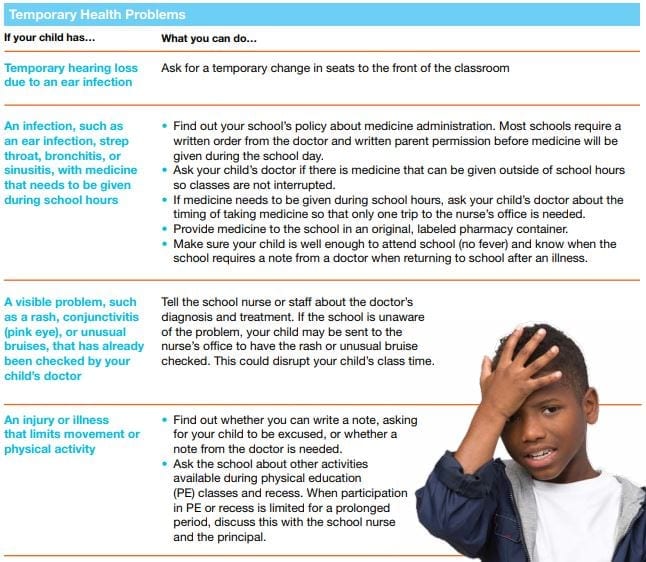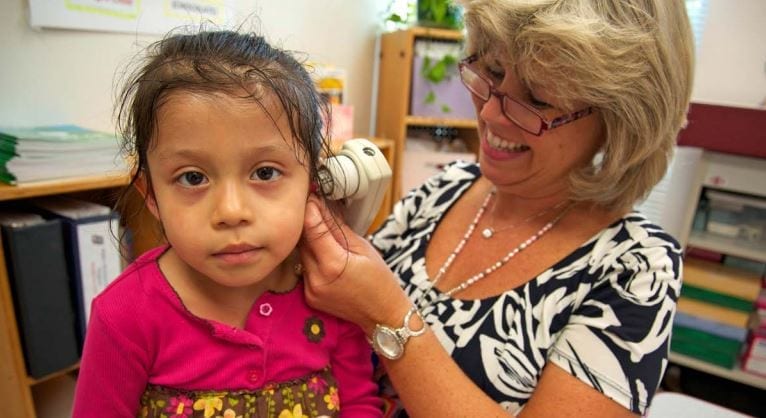School nurses play an important role in schools. The responsibilities of school nurses have grown over the past century. Although the focus of keeping students healthy and in school is the same, the health needs and complexity of many students have changed.
Today’s school nurse may be responsible for
• Identifying and tracking diseases
• Chronic condition management
• Health screening examinations
• Emergency preparedness and response
• Behavioral assessment
• Individual and school-wide health education
• Individual care management
HEALTH SERVICES IN SCHOOL
Health services offered within schools can vary. A school nurse or another health care professional, such as a health aide, nursing assistant, or another trained or certified staff member, may perform school health services. Some schools may also have a school-based or school-linked health center staffed by a physician or
nurse practitioner. In the United States, many school nurses must hold a current license as a registered nurse (RN). Educational and licensing requirements for RNs vary by state. Nurse practitioners are RNs with advanced training and education.
SCHOOL NURSE
A school nurse may work in one school or several schools.
- In some schools, there is a full-time school nurse who attends to the acute and chronic health needs of students. He or she may
- Give out medicines
- Perform health assessments and screenings
- Perform special procedures ordered by a child’s doctor
- Refer students to their doctors for physical exams, diagnosis, and treatment
- Attend to students with acute illness and injuries
- Play an important role in promoting a healthy and safe school environment and teaching students how to become healthy adults
- In some communities, a full-time school nurse is responsible for several schools and spends a portion of time in each school. He or she may
- Supervise and monitor a health aide or nursing assistant
- Train other staff, including teachers, administrators, secretaries, and health aides, to handle acute health situations when the nurse is not at the school
- Train other staff to assist in routine medicine administration and to perform some health procedures for children with chronic health conditionsSCHOOL-BASED HEALTH CENTERS
Some schools have school-based health centers (SBHCs). SBHCs can provide a variety of services, including medical, dental, nutrition, and mental health services. These services can be provided by a variety of health care professionals, such as nurse practitioners, health educators, mental health providers, and nutritionists.
SBHCs provide an important and successful means of delivering care to students in situations where care is limited because of a lack of access to health care
providers, insurance, or transportation. The American Academy of Pediatrics believes that all children deserve a “medical home” and supports SBHCs, especially in areas where children do not have access to health care.
SEEING THE NURSE
Most students that have a health issue come up during class can go to the school’s health office and speak with the nurse, usually just by asking their teacher. Parents can contact the nurse if they have any questions. Most illnesses and injuries that arise during the school day are minor bumps, scrapes, and headaches,
and they can be cared for by the school nurse. Students may be excused from class if necessary, usually just by asking their teacher. In most instances students can return to class, which is the goal, unless the condition interferes with their ability to actively participate in class. When the problem is more serious, such as ever,
vomiting, or a bad asthma attack, a parent will be called to take his or her child home.
EMERGENCY SITUATIONS
Rarely, a serious or life-threatening situation may require a child to be transported by ambulance to the hospital emergency department. In many but not all schools, one or more staff members have been trained in CPR (cardiopulmonary resuscitation) and first aid. Ask if your school has an automated external defibrillator (AED). Many staff are now also trained to perform other life-saving procedures, such as administration of epinephrine during a life-threatening allergic reaction known as anaphylaxis. It is important for parents to know how these situations are handled at their child’s school.
TEMPORARY HEALTH PROBLEMS: WHAT PARENTS CAN DO
Sometimes your child may have a health issue that does not last long but still interferes with daily school. It’s important to let the school nurse, teachers, or principal know if your child has any health problems that may interfere with school.

CHRONIC HEALTH CONDITIONS: WHAT PARENTS NEED TO KNOW
When your child has a chronic health condition, it is important to share this information with the school nurse. Be sure to do so at the beginning of the year, but
also throughout the year if there is a change in your child’s health that could affect his school day or the care he needs during the school day. If your child is new to the school, be sure to learn how to contact the school nurse and begin working with the school nurse before your child starts school. This way, the nurse can work with you and your child’s doctor on a care plan so your child’s health condition is safely and effectively managed during the school day. Be sure to provide the school nurse with detailed information to plan for steps to be taken if your child experiences an emergency during the school day.
- Medicines. If medicine must be administered during the school day, talk with your school nurse and provide the nurse with the physician’s orders and instructions for the medicine. Make sure you follow the policy for bringing your child’s medicine to school. You can often find this information on your school or school district’s Web site. The school nurse can give you the specific instructions and help you find the correct forms that are required for your child’s specific needs.
- Procedures. If your child requires special medical care during the school day, you will need to work with the school nurse and your child’s doctor to develop an effective plan. The school nurse will likely need to contact the doctor directly to be sure she or he has all of the information needed regarding your child’s health condition.
Common Chronic Health Problems
- Asthma
- Share your student’s Asthma Action Plan with the nurse. If you do not have an Asthma Action Plan, discuss with your child’s doctor how to prepare one for your child.
- Find out if the school has a policy for your child to self-carry his or her own inhaler and administer the medication. If so, work with the school nurse to
determine if your child can do so responsibly.
- Severe or life-threatening allergy
- Be sure to alert the school nurse about your child’s allergy. The school nurse can help communicate this information to those in the school who
need to know. - Work with your doctor and the school nurse to create an individualized health care plan, including what to do in case of an emergency. This can help to quickly avoid a more dangerous event if your child has an unexpected exposure.
- If your child has severe allergy and risk for anaphylaxis, talk with your doctor and school nurse about a plan for administering epinephrine at school. Ask to meet with key school staff members who will care for your child during the school day. The school may identify a core team to help manage your
child’s allergy.
- Be sure to alert the school nurse about your child’s allergy. The school nurse can help communicate this information to those in the school who
- Seizures
- Share with your school health nurse any known triggers for your child’s seizures.
- Work with your child’s doctor and the school nurse to create a Seizure Action Plan that will be followed if your child experiences a seizure during the school day. The plan should include how emergency medicines should be used to stop a seizure, if your child’s doctor has prescribed them.
- Diabetes
- Make sure your child’s doctor fills out a Diabetes Medical Management Plan and provide it to the school nurse.
- If your child has an insulin pump, make sure there is a backup plan for administering insulin in case of insulin pump failure or accidental pump removal.
- Work with the school nurse to determine all staff that will administer glucagon in case of emergency.
- Make sure your child knows how and to whom to communicate when your child feels “low” or “high” because of his or her diabetes.

American Academy of Pediatrics

